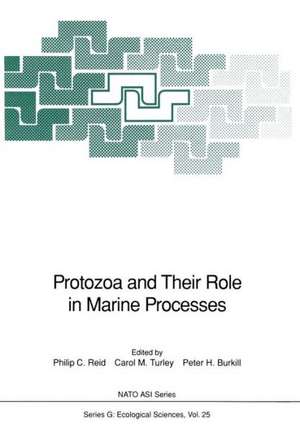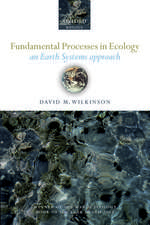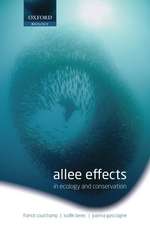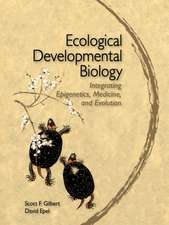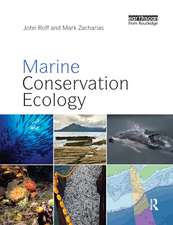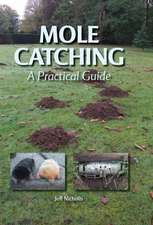Protozoa and Their Role in Marine Processes: Nato ASI Subseries G:, cartea 25
Editat de P.C. Reid, C.M. Turley, P.H. Burkillen Limba Engleză Paperback – 10 dec 2011
Din seria Nato ASI Subseries G:
- 15%
 Preț: 662.62 lei
Preț: 662.62 lei - 18%
 Preț: 979.22 lei
Preț: 979.22 lei - 18%
 Preț: 956.50 lei
Preț: 956.50 lei - 15%
 Preț: 657.08 lei
Preț: 657.08 lei - 18%
 Preț: 949.10 lei
Preț: 949.10 lei - 18%
 Preț: 1235.25 lei
Preț: 1235.25 lei - 18%
 Preț: 967.40 lei
Preț: 967.40 lei - 15%
 Preț: 663.93 lei
Preț: 663.93 lei - 18%
 Preț: 957.44 lei
Preț: 957.44 lei - 15%
 Preț: 642.51 lei
Preț: 642.51 lei - 18%
 Preț: 950.96 lei
Preț: 950.96 lei - 5%
 Preț: 710.60 lei
Preț: 710.60 lei - 18%
 Preț: 979.08 lei
Preț: 979.08 lei - 5%
 Preț: 1107.06 lei
Preț: 1107.06 lei - 15%
 Preț: 650.69 lei
Preț: 650.69 lei - 18%
 Preț: 966.27 lei
Preț: 966.27 lei - 18%
 Preț: 958.56 lei
Preț: 958.56 lei - 18%
 Preț: 962.49 lei
Preț: 962.49 lei - 15%
 Preț: 650.19 lei
Preț: 650.19 lei - 15%
 Preț: 653.33 lei
Preț: 653.33 lei - 18%
 Preț: 960.78 lei
Preț: 960.78 lei - 15%
 Preț: 657.57 lei
Preț: 657.57 lei - 18%
 Preț: 959.50 lei
Preț: 959.50 lei - 15%
 Preț: 640.06 lei
Preț: 640.06 lei - 18%
 Preț: 959.19 lei
Preț: 959.19 lei - 18%
 Preț: 958.38 lei
Preț: 958.38 lei - 15%
 Preț: 647.40 lei
Preț: 647.40 lei - 15%
 Preț: 649.71 lei
Preț: 649.71 lei - 18%
 Preț: 950.03 lei
Preț: 950.03 lei - 15%
 Preț: 655.13 lei
Preț: 655.13 lei - 18%
 Preț: 950.96 lei
Preț: 950.96 lei -
 Preț: 391.02 lei
Preț: 391.02 lei - 5%
 Preț: 1650.15 lei
Preț: 1650.15 lei - 15%
 Preț: 641.03 lei
Preț: 641.03 lei - 18%
 Preț: 1228.96 lei
Preț: 1228.96 lei - 15%
 Preț: 652.49 lei
Preț: 652.49 lei - 15%
 Preț: 670.17 lei
Preț: 670.17 lei - 18%
 Preț: 955.88 lei
Preț: 955.88 lei - 15%
 Preț: 647.59 lei
Preț: 647.59 lei - 18%
 Preț: 957.13 lei
Preț: 957.13 lei
Preț: 958.56 lei
Preț vechi: 1168.98 lei
-18% Nou
Puncte Express: 1438
Preț estimativ în valută:
183.44€ • 199.19$ • 154.09£
183.44€ • 199.19$ • 154.09£
Carte tipărită la comandă
Livrare economică 22 aprilie-06 mai
Preluare comenzi: 021 569.72.76
Specificații
ISBN-13: 9783642731839
ISBN-10: 364273183X
Pagini: 520
Ilustrații: X, 506 p.
Dimensiuni: 170 x 242 x 27 mm
Greutate: 0.82 kg
Ediția:Softcover reprint of the original 1st ed. 1991
Editura: Springer Berlin, Heidelberg
Colecția Springer
Seria Nato ASI Subseries G:
Locul publicării:Berlin, Heidelberg, Germany
ISBN-10: 364273183X
Pagini: 520
Ilustrații: X, 506 p.
Dimensiuni: 170 x 242 x 27 mm
Greutate: 0.82 kg
Ediția:Softcover reprint of the original 1st ed. 1991
Editura: Springer Berlin, Heidelberg
Colecția Springer
Seria Nato ASI Subseries G:
Locul publicării:Berlin, Heidelberg, Germany
Public țintă
ResearchCuprins
Taxonomy.- Taxonomy (46 — or more — protistan phyla) — Session summary.- A taxonomic review of heterotrophic protists important in marine ecology.- Methods.- Methods for the study of marine microzooplankton — Session summary.- Quantitative sampling of field populations of protozooplankton.- The application of image analysed fluorescence microscopy for characterising planktonic bacteria and protists.- Culturing marine protozoa — Session summary.- A method for the cloning and axenic cultivation of marine protozoa.- Pollution.- Pollution — Session summary.- Protists and pollution — with an emphasis on planktonic ciliates and heavy metals.- Effects of saline sewage on the biological community of a percolating filter.- Symbiosis.- Endosymbiosis in the protozoa — Session summary.- Mixotrophy in marine planktonic ciliates: physiological and ecological aspects of plastid-retention by oligotrichs.- Autecology.- Brief perspective on the autecology of marine protozoa.- Trophic Behaviour.- Trophic behaviour — Session summary.- Community Grazing.- Community grazing in heterotrophic marine protista — Session summary.- Trophic behaviour and related community feeding activities of heterotrophic marine protists.- Energetics and Production.- Protozoan energetics — Session summary.- Global production of heterotrophic marine planktonic ciliates.- Marine ‘Snow’ and ‘Fluff’.- Protozoa associated with marine ‘snow’ and ‘fluff’ — Session summary.- Protozoa as makers and breakers of marine aggregates.- Mineral Flux.- Mineral flux and biogeochemical cycles of marine planktonic protozoa — Session summary.- Protista and mineral cycling in the sea.- Nutrient Cycling.- Evolving role of protozoa in aquatic nutrient cycles.- Protozoans as agents in planktonicnutrient cycling.- Modelling.- Modelling — Session summary.- Modelling carbon and nitrogen flows in a microbial plankton community.- Workshop Summary and Forward Look.- Status and future needs in protozoan ecology.- List of Participants.
